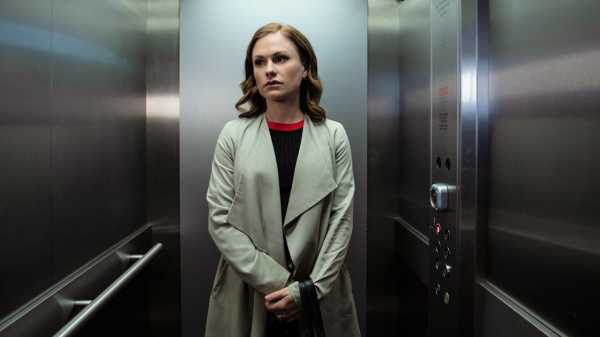
“Flack” (Pop) stars Anna Paquin as the most valuable employee of the world’s most dastardly P.R. firm. Sidney Falco Publicity is its lodestar of ethical conduct, the office of Sarah Sanders its only rival in mendacity. The company attends to all the standard work of supervising celebrities’ brand images; in a fine throwaway, Paquin’s character, named Robyn, coaches expressions of feelings other than envy and contempt onto the face of a losing nominee at an awards dinner. But “Flack” concentrates most on Robyn’s aptitude for crisis management. Accoutered with two phones, one unpaid intern, and no scruples, Robyn plies her trade with lies, planted stories, blackmail threats, and a kennel’s worth of dog-wagging. She is adept at applying local anesthesia to the consciences of clients and collaborators. Half of her conversations never happened. Her skill set is an organic expression of her soullessness. Fixer, fix thyself!
The setting is London, to which this American girl fled after the death of her difficult mother; this is the psychic wound suppurating at the heart of a character fished out of the damaged-goods bin at the prefabricated-female-lead outlet. (“You’re complicated,” a sex-addicted celebrity chef tells her.) Robyn begins the series in a client’s littered hotel suite, where she compresses the smooth chest of an unconscious lad who’s been partying with a closeted Chelsea F.C. player. She revives the guy, slaps some sense into the footballer, blows a leftover rail of cocaine on her way out, and strides elsewhere to fall asleep in her stilettos. Among the many clichés “Flack” indulges is its focus on Robyn’s shoes—as she swans away from tabloid gaggles, as she strides urgently toward appointments. Oddly, she is almost always wearing the same pair. Perhaps the costume department blew its budget on the menacingly chic ensembles encasing Robyn’s boss, played by Sophie Okonedo, who maintains her dignity in a chintzy girl-boss role by making like Joan Crawford cast as Olivia Pope. Robyn’s deskmate, Eve (Lydia Wilson), is likewise well turned out and vivaciously portrayed, as if Eve secured her job with a nepotistic boost from her godmother and role model, Patsy Stone.
The professional challenges that Robyn faces are often plausible, and far more compelling than their resolutions, which are mostly stupid. “Flack” has little to say about celebrity culture with its stories of contrived sex tapes, hushed-up face-lifts, sham marriages, and bogus redemption narratives. Meanwhile, Robyn’s cocaine habit is not taken seriously; it’s a self-destructive behavior to fill in a blank, a cheap buzz for the viewer, an excuse to get Eve set up on a date with one of Robyn’s friends from her support group. (Robyn’s other pharmaceutical issue is her continued intake of birth-control pills, even though her cardboard boyfriend thinks they’re trying to conceive a baby.)
The show gets somewhat less uninteresting around the fifth episode, which is set in the business-class cabin of a transatlantic flight and proves an intriguingly creepy role for Bradley Whitford, who plays a movie star whom Robyn chaperones to New York. On the tarmac, the boorish client and the craven press agent stagily share their demons; just before takeoff, the guy comes to believe that he’s been found out as an especially odious sex criminal. Though it’s unlikely Robyn could or would engineer a reputation-saving Hail Mary pass from thirty-seven thousand feet, the episode represents a memorably stylish exercise in sneering at evil and examining its enablers. When the plane encountered turbulence, I rooted for the air pocket.
Sourse: newyorker.com






